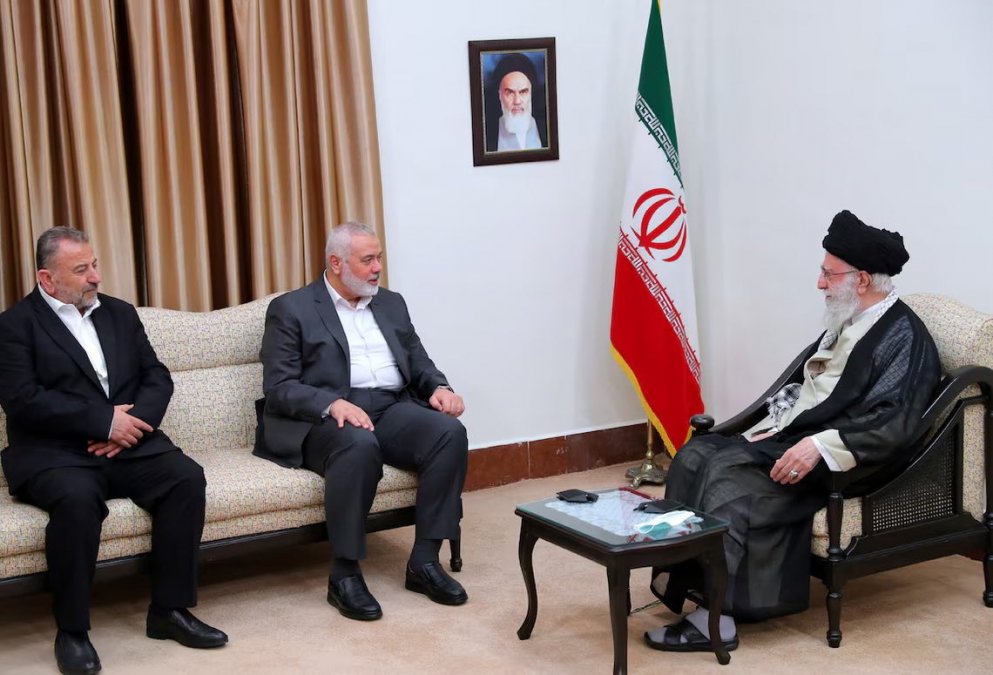Israeli media analysis of Palestinian leaders’ visit to Tehran
Israeli media, analyzing the recent visit of Hamas and Islamic Jihad leaders and also the attacks by Iraqi and Yemeni resistance groups on the Eilat port and the occupied Golan region, as well as Hezbollah’s attacks on the Golan and the northern border of occupied Palestine, wrote that Iran is preparing for the next phase of its attritional war against Israel.
According to Irangate, the Israeli newspaper Yedioth Ahronoth wrote in an analysis that, unlike Israel, which has no plan for the next phase of the war in Gaza, Iran is preparing for a new phase of military engagement on several different fronts with Israel.
According to this Israeli newspaper, Iran has maintained its influence in the Palestinian arena and assesses that Israel is incapable of destroying the military capabilities and leadership cadre of Hamas and will gradually sink into the quagmire of Gaza, similar to Lebanon. Ahronoth continued, writing that while negotiations for a hostage deal are at a standstill and Israel feels signs of its war in the Gaza Strip becoming a quagmire, it seems that preparations for the post-war period are underway in Iran.
The right-wing Israeli newspaper Jerusalem Post also, referring to recent attacks by Iraqi Islamic resistance forces on areas in the Eilat port and the occupied Golan Heights, wrote that the increase in drone attacks on Israel by Iran-backed militias in the region shows that Iran’s proxy war capabilities are increasing, as is its willingness to push the region towards chaos.
According to this report, Iran-backed militias in Iraq claimed responsibility for two attacks on Israel this week. According to Al-Mayadeen, the Islamic resistance in Iraq claimed to have targeted a vital objective deep within Israeli territory. The report states that the Islamic resistance in Iraq announced that its fighters attacked areas in the heart of Israel with appropriate weapons on Monday morning. This report seems to be about the Sunday night attacks on the Eilat port. Targeting the Eilat port from Iraqi soil is an action aimed at escalating tensions by Iran-backed groups.
This action took place a day after the same group in Iraq, representing several Iran-supporting militias with drones and missiles, claimed to have targeted the Christian village of Ilabon in Galilee. Iran-supporting groups have repeatedly targeted Eilat since Hamas’s attack on Israel on October 7. The Yemeni Houthis have repeatedly attacked the Eilat port using missiles and drones from a distance of 2,000 kilometers.
The Israeli army said early Monday morning that following sirens in the city of Eilat and the Holilot area indicating the penetration of hostile aircraft, Israeli army soldiers identified a suspicious aerial target that had infiltrated Israeli territory from the east. This projectile fell in the Eilat Gulf area. No casualties were reported, and only minor damage was caused to a building. Also, according to Al-Mayadeen, on March 31, the Islamic resistance in Iraq announced that it had attacked an Israeli military target in the Syrian Golan with drones.
According to the Jerusalem Post, these threats occur after Iran seems to have tried to simultaneously expand the circle of unrest to Jordan and the West Bank. Reports published in Iran-backed media have highlighted recent anti-Israeli protests in Jordan and also emphasized warnings by groups in the West Bank against the Palestinian Authority. In another report, the Jerusalem Post, referring to the recent visit of Ismail Haniyeh and Ziyad al-Nakhalah, leaders of Hamas and Islamic Jihad, to Tehran, wrote that the visit of these Palestinian leaders to Tehran is a sign of the possibility of the Gaza war entering a new and next phase.
This report, pointing out that this visit coincides with the unrest stemming from Ramadan in Palestinian areas, wrote that the meetings of these two Palestinian leaders in Tehran occur at a specific time. This is the last week of Ramadan, which in the official Iranian calendar is known as Quds Day on the last Friday of Ramadan. The report further stated that the visit of Haniyeh and al-Nakhalah to Tehran also takes place on the eve of the six-month anniversary of the Al-Aqsa Storm operation, and this visit likely heralds a new phase of conflicts.
In the past, such meetings have occurred during periods of heightened tension. These groups have also held more meetings to coordinate multiple fronts against Israel as part of the strategy of unifying fronts against Israel.

